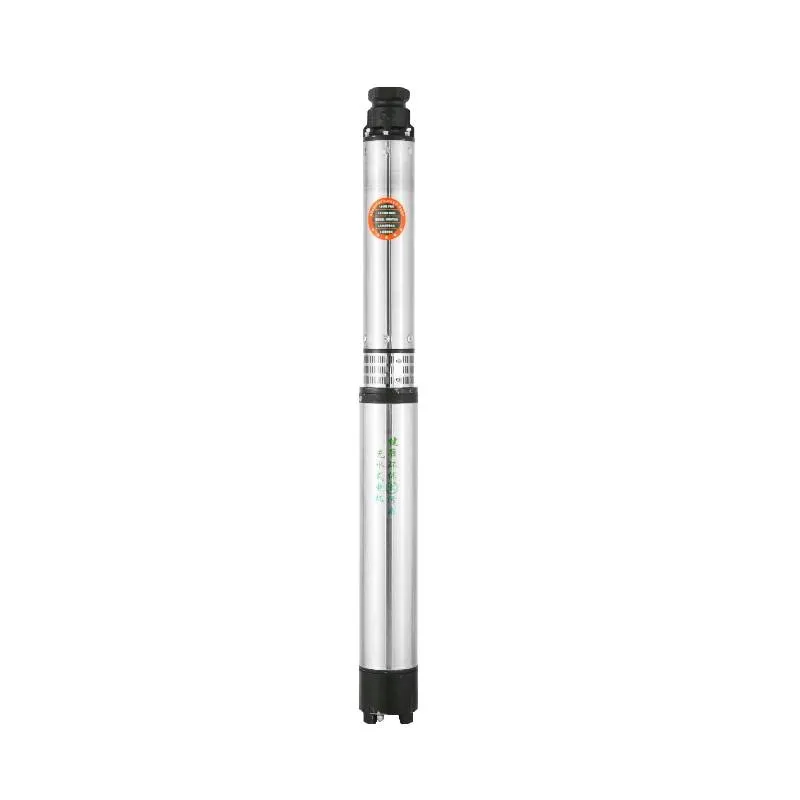Sep . 22, 2024 17:14 Back to list
submerged well pump
Understanding Submerged Well Pumps Functionality and Applications
Submerged well pumps, also known as submersible pumps, are essential devices used to extract water from deep underground sources. These pumps have gained significant attention due to their efficiency in various applications, ranging from residential water systems to industrial setups. This article delves into the workings, advantages, and applications of submerged well pumps.
Functionality of Submerged Well Pumps
Submerged well pumps are designed to operate underwater, typically within a borehole or well. The pump is sealed in a housing that is submerged in water, allowing it to push water to the surface through a discharge pipe. The centrifugal force generated by the pump's impeller moves the water upward while also providing the necessary pressure to transport it to its intended location.
The construction of submerged well pumps typically includes a robust motor and a series of stages comprising impellers and diffusers. These components work in synergy to produce higher flow rates and the ability to lift water from significant depths. One of the key features of these pumps is their ability to function reliably underwater, minimizing the risk of overheating since the surrounding water helps dissipate heat.
Advantages of Submerged Well Pumps
One of the primary advantages of submerged well pumps is their efficiency. Being placed directly in the water eliminates the need for a suction line, significantly reducing the chances of cavitation and suction problems that air can cause. Furthermore, these pumps operate quietly, making them ideal for residential applications where noise may be a concern.
submerged well pump

Another significant benefit is their ability to manage varying water levels. Submerged well pumps can effectively operate in wells with fluctuating water levels, ensuring a steady water supply even during dry seasons. This adaptability is crucial for agricultural purposes.
Moreover, submerged well pumps have a long lifespan and require minimal maintenance. Their robust construction protects them from potential wear and tear, making them suitable for continuous operation under harsh conditions.
Applications of Submerged Well Pumps
Submerged well pumps are commonly used in various sectors. In residential settings, they are employed for drinking water supply, irrigation, and landscaping. Farmers also utilize these pumps to access groundwater for crops, especially in areas where surface water is scarce.
In industrial environments, submerged well pumps are vital for dewatering construction sites or managing water levels in mines. They also find applications in wastewater management, ensuring that effluent is effectively transported to treatment facilities.
In conclusion, submerged well pumps play an indispensable role in accessing subterranean water sources. Their efficiency, durability, and versatility make them a preferred choice across multiple domains. As water scarcity and management become increasingly critical issues globally, the significance of these pumps will likely continue to grow, ensuring a dependable water supply for various needs.
-
Submersible Water Pump: The Efficient 'Power Pioneer' of the Underwater World
NewsJul.01,2025
-
Submersible Pond Pump: The Hidden Guardian of Water Landscape Ecology
NewsJul.01,2025
-
Stainless Well Pump: A Reliable and Durable Pumping Main Force
NewsJul.01,2025
-
Stainless Steel Submersible Pump: An Efficient and Versatile Tool for Underwater Operations
NewsJul.01,2025
-
Deep Well Submersible Pump: An Efficient 'Sucker' of Groundwater Sources
NewsJul.01,2025
-
Deep Water Well Pump: An Efficient 'Sucker' of Groundwater Sources
NewsJul.01,2025
-
 Submersible Water Pump: The Efficient 'Power Pioneer' of the Underwater WorldIn the field of hydraulic equipment, the Submersible Water Pump has become the core equipment for underwater operations and water resource transportation due to its unique design and excellent performance.Detail
Submersible Water Pump: The Efficient 'Power Pioneer' of the Underwater WorldIn the field of hydraulic equipment, the Submersible Water Pump has become the core equipment for underwater operations and water resource transportation due to its unique design and excellent performance.Detail -
 Submersible Pond Pump: The Hidden Guardian of Water Landscape EcologyIn courtyard landscapes, ecological ponds, and even small-scale water conservancy projects, there is a silent yet indispensable equipment - the Submersible Pond Pump.Detail
Submersible Pond Pump: The Hidden Guardian of Water Landscape EcologyIn courtyard landscapes, ecological ponds, and even small-scale water conservancy projects, there is a silent yet indispensable equipment - the Submersible Pond Pump.Detail -
 Stainless Well Pump: A Reliable and Durable Pumping Main ForceIn the field of water resource transportation, Stainless Well Pump has become the core equipment for various pumping scenarios with its excellent performance and reliable quality.Detail
Stainless Well Pump: A Reliable and Durable Pumping Main ForceIn the field of water resource transportation, Stainless Well Pump has become the core equipment for various pumping scenarios with its excellent performance and reliable quality.Detail
